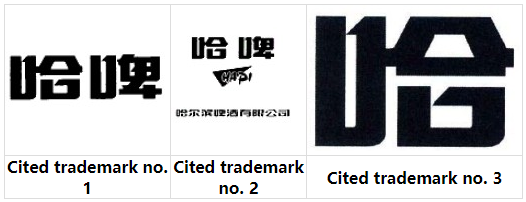


Recently, AB InBev Harbin Brewery Co., Ltd’s (hereinafter referred to AB InBev) invalidation declaration application against the “Ha Bing Chun Shuang” trademark registered by Harbin Bingchun Trading Co., Ltd. on type 32 products including beer, represented by our firm, was concluded. The Trademark Review and Adjudication Board supported our contention for the evaluation and who declared the invalidation of the registration of this trademark.
After the trial, the Trademark Review and Adjudication Board held as follows: the spotlight of the dispute in this case was whether or not the disputed trademark constituted similar trademarks on the same or similar product with the “Ha Pi” series trademarks AB InBev registered in advance on beer products.
The Trademark Review and Adjudication Board held that, the disputed trademark consisted of the normal printed Chinese characters “Ha Bing Chun Shuang”, in which “Bing Chun Shuang” would be likely to be interpreted by consumers as descriptive words of the taste and texture of products including “beer”. Cited trademark no. 3 was “Ha Pi”, the distinguishing part of cited trademark no. 4 was “Ha Pi” and cited trademark no. 5 was “Ha”. The distinguishing part of the disputed trademark was “Ha”, which resembled the main distinguishing parts of cited trademarks no. 3 and no. 4, and the Chinese characters of cited trademark no. 5. There was also no obvious difference in their meanings. The disputed trademark was approved to be used on products including “beer”, which were the same or similar products to those that cited trademarks no. 3, 4 and 5 were approved to be used on. The applied party and the applicant were in the same geographic area. According to confirmed facts, the applicant’s “Ha Pi” series trademarks had higher popularity on “beer” products in advance, having a certain amount of influence. Therefore, the applied party should be aware of the applicant’s “Ha Pi” series trademarks. It could hardly have been a coincidence that the disputed trademark was similar to cited trademarks no. 3, 4 and 5. Also, according to confirmed facts, the applied party had applied for the registration of dozens of trademarks that were similar to “Ha Pi” trademarks on type 32 products and on type 42 services and other categories. It would difficult to assume that the applied party’s action of applying for the disputed trademark was made in good faith. The registration of the disputed trademark would easily cause the relevant public to assume that the disputed trademark had belonged to the same series with cited trademarks no. 3, 4 and 5, or that there had been a special connection between. It would, therefore, cause a misconception of the sources of products. The disputed trademark and cited trademarks no. 3, 4 and 5 constituted similar trademarks on the same or similar trademarks described in article 30 of the Trademark Law. Therefore, the Board gave invalidation declaration on the disputed trademark.
Judging from the adjudication of the Trademark Review and Adjudication Board, during the evaluation process of this case, the Board, while adhering to the standards of trademark resemblance, not only considered the components of the opposed trademark and cited trademarks themselves, distinguishing the distinctive and non-distinctive parts in the disputed trademark and comparing main components for confirmation, but also took into account the long-term application and popularity of the cited trademarks. It also took into account factors such as the subjective procedure, made by the applied party in bad faith, of applying several similar trademarks to “Ha Pi” trademarks on many types of products and services, making the justifiable adjudication eventually.
The significance of this case is as follows: Currently, there are several registration applications, filed for trademarks that begin with “Ha”, on several types of products and services including type 32, 35, 41 and 43. The evaluation result of this case offered positive guidance for the opposition and invalidation declaration applications for those trademarks. It is also greatly meaningful for such harmful action of copying, imitating and plagiarizing in large-scale the “Ha Pi” series trademarks of AB InBev.
Appendix: Trademarks

The opposed trademark

 业务领域:
业务领域: 此案件代理人
此案件代理人
